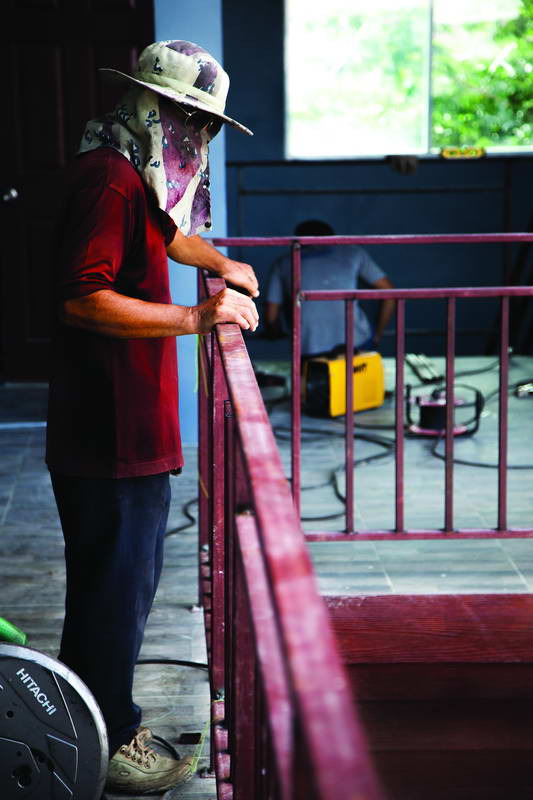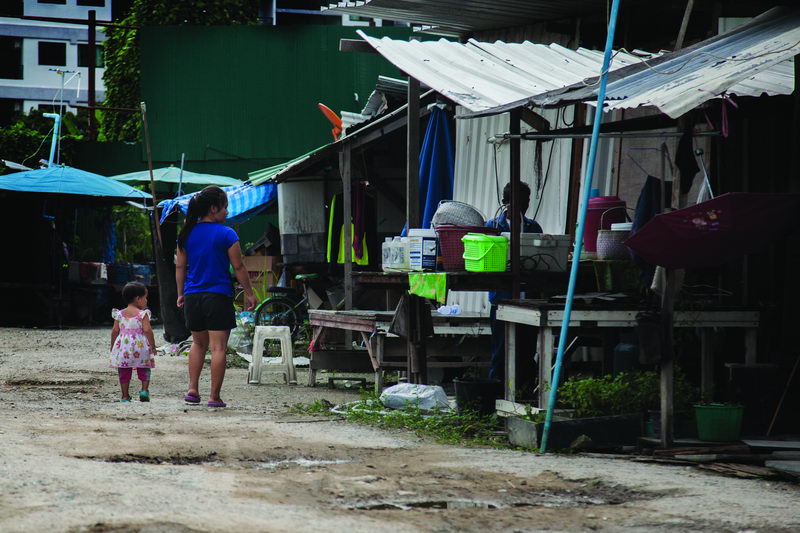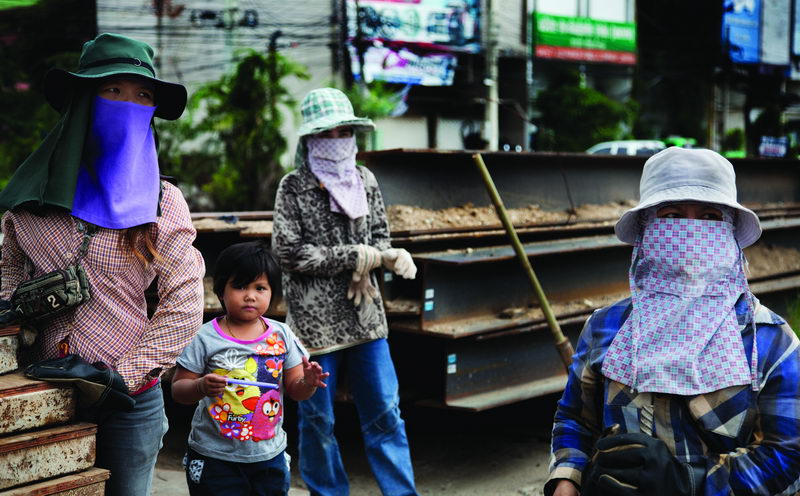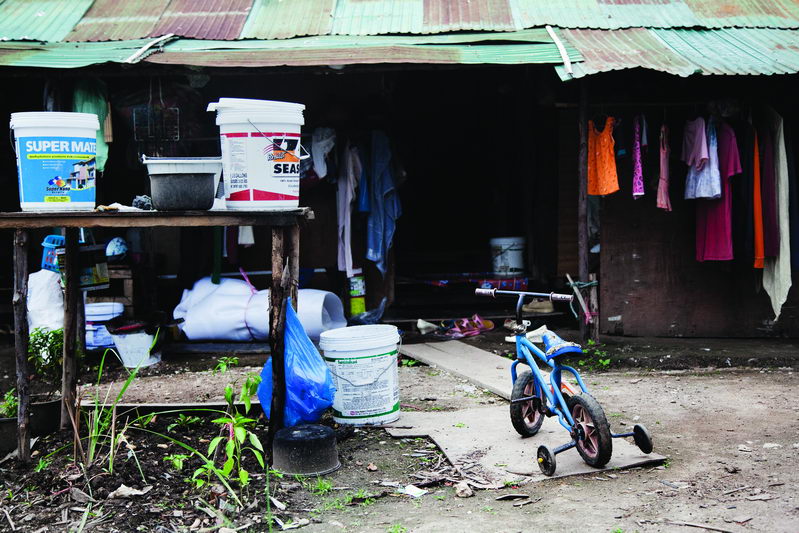

In early September, 36 migrant workers on a Chiang Mai building site went on strike. The men, from Burma, claimed they had been paid considerably less than the minimum wage and had not received passports and work permits they had paid for. The matter was eventually resolved but the rare incident highlighted the problems faced by migrant workers in northern Thailand, which experts say have worsened since the May 22 coup.
The junta announced in June that it would crack down on illegal migrant workers, sparking an exodus of Burmese and Cambodian labourers. Around 200,000 Cambodians left Thailand that month, according to reports. On the face of it, the crackdown seemed reasonable – companies were told to register illegal workers or risk being charged with human trafficking and illegal migration offences. Migrant workers here illegally could expect to be arrested. However, critics say the new regulations open more avenues for abuse by unscrupulous employers.
The striking workers claimed they had agreed with the company earlier this year that 15,000 baht would be deducted from their salaries so they could apply for passports and work permits, which they hadn’t received.
But when the military government announced that it would open one-stop centres where migrant workers could get temporary permits, the company – whose name we are withholding for legal reasons – angered them by saying they would have to pay again to register under the new system. The men also claimed they were earning just 170 baht a day, considerably less than the 300 baht minimum wage.
Migrant workers from Burma – including many ethnic Shan and Karen people from the east of the country – have for decades sought employment in Thailand, often escaping political persecution and a lack of jobs at home. Others came as refugees, fleeing bloody ethnic conflicts in Karen and Shan states. However, it’s not an easy ride here when they often get a raw deal, commonly earning around 150 baht a day or less. Still, it’s more than most could expect to earn back home.
“Garment workers in Burma actually earn less than those in Bangladesh. They earn the bottom of the bottom wage,” says Phil Robertson of Human Right Watch. “It’s hard to find work in Burma, they have a high underemployment rate.”

It is difficult to count people who don’t want to be counted, but experts say there are an estimated two to three million migrant workers in Thailand, most of them undocumented. The majority of these are from Burma and Laos, then Cambodia. According to a report by the Office of the National Security Council, Thailand had no less than three million migrants within its borders – more than 80 percent of them from Burma – in 2012.
Most of these, both documented and undocumented, work in low-skilled jobs in Bangkok and the southern and northern provinces, according to the International Labour Organisation (ILO). The majority work in fisheries, agriculture, construction, manufacturing and in the service sector, as waiters or domestic workers. So unsurprisingly, they are vital to Thailand’s economy. The kingdom exports masses of fish and seafood each year, earning millions in revenue, yet the workforce in this sector is made up almost exclusively of migrants. In fact, 15 per cent of all migrants are employed by fisheries, compared with a mere two percent of Thais.
This can also be said about the construction workforce, in which 14 percent of migrants are employed, compared to only 6 percent of Thais. The ILO also estimates that more than half of all domestic workers in Thailand are migrants. Ballpark figures by the ILO suggest that labour by migrant workers accounted for 6.2 percent of Thailand’s GDP in 2005, figures which have remained constant today.
Official reports suggest that migrants are mostly young taxpayers coming to earn a living and assimilating well, yet despite this – and their indispensable contribution to the economy – they live on the fringes of society.
The ILO says there is a false belief among many Thais that migrant workers commit a disproportionate amount of crimes. Last month, two young British tourists were murdered on Koh Tao, and within hours fingers were being pointed at the island’s migrant worker community despite an initial (and resulting) lack of evidence.
This attitude towards migrants may help to explain how the many abuses they suffer are often overlooked. The official term used is raeng ngan tang dao, or alien workers, which helps to dehumanise them and encourages discrimination, says Brahm Press of the MAP Foundation, which helps Burmese migrant workers in Thailand.
Child Welfare
Most migrant workers are aged between 15 and 28. Younger ones were most likely brought here by their parents or born on Thai soil. In 2005, the government introduced an ‘Education For All’ policy which promised free education for any child living in Thailand, regardless of nationality. However, there have been reports of some schools refusing to accept migrant children, often because Thai parents don’t want their children mixing with the sons and daughters of poor labourers from Burma. And last month, education authorities said they were considering slashing funding for migrant children, whose parents might be asked to pay for student uniforms, books and development activities. Pretty tough on 150 baht a day.
“I guess I’m not surprised that when budget cuts beckon, the support needed for migrant children to go to school is at the top of the list to get chopped,” said Robertson of HRW. “But according to Thailand’s international rights obligations, the concept of free and compulsory primary education for all should not be compromised and the Thai government should find others ways to trim budgets that do not obstruct the ability of all children to attend school.

“There are tens of thousands of migrant children from Burma, Cambodia and Laos who are living with their parents or other relatives in Thailand who need to receive a basic education. Some of them have travelled with their families as their parents came to seek work, while some are actually born in Thailand. Frequently their migrant parents are illegally paid much less than the minimum wage, they have little medical or other benefits so have to pay out of pocket, and therefore have very minimal savings _ meaning that they usually lack the funds to pay for books, uniforms, and other requirements that attending a Thai school entails.”
Robertson pointed out that not all migrant children enter the Thai education system. Some migrant communities set up their own schools, while some parents send their children back to live with relatives while they receive an education in their home country. He called on Thailand to ensure that it meets its obligations under the UN Convention of the Rights of the Child, which make it responsible for safeguarding the rights of all children on Thai soil.
“The Thai government should reflect on the fact that Thailand has been highly praised for its education for migrants initiatives which stand out in contrast to the other rather poor, rights-abusive policies affecting migrants from other countries,” he said. “If Thailand restricts the education for all policy for migrants, there will be very little left positive to say about Thailand’s treatment of its migrant worker populations.”
Registration Problems
Every few years, registration centres are set up to give undocumented workers the chance to work legally in Thailand, a form of amnesty promising an opportunity to start again. Shortly after the May 22 coup, the ruling National Council for Peace and Order announced that it would set up “one-stop service centres” nationwide, where migrant workers can get a three-month visa, giving them time to return home and get a proper passport, re-enter Thailand legally and get a work permit. So far, more than a million workers have already registered. However, given the history and frequency of these amnesties it seems likely that it won’t work as intended. Most organisations working with or observing the migrant worker’s situation believe it won’t take long to return to the status quo.
“The problem with the system is that migrant workers, to get their permits, must register with an employer. In the past this has given abusive employers full control over the workers, so many migrant workers run away and find other work paid under the table again,” said Robertson, adding that HRW has urged the Thai government to create better systems that are fairer for both workers and employers.

The future remains uncertain for Thailand’s millions of migrants as the junta has not yet announced the next stage of the registration process. The situation is “very confusing”, says Press of the MAP Foundation.
So far, he said, people are registering without really knowing what they need to do next, and they rarely receive information in their own language. The process costs between 3,000 and 5,000 baht, but many have been overcharged by agents and employers, sometimes paying almost twice as much. The service centre in Chiang Mai was set up in small tents, meaning people had to queue outside in rain or strong sunshine – even pregnant women and those with children.
Robertson outlined what he thinks would be a better plan that would raise standards, suggesting that migrant workers be given a five-year working visa with the freedom to change employers. According to the MAP Foundation, some migrant workers have begun to cheat the system by registering with an agent who acts as an employer, giving them legal working status although they still have to find work under the table.
Harsh Conditions
Migrant workers frequently face abuse and poor conditions in the workplace. They are often completely at the mercy of their employer, and attempts to seek compensation or justice often result in threats, intimidation and at worst beatings, rapes and murders.
“Workers who sought to organise and collectively assert their rights were subject to intimidation and threats by their employers, and retaliation if they filed grievances with Thai authorities,” Human Rights Watch said in a 2010 report titled From the Tiger to the Crocodile. The title plays on the Thai phrase “escaping the tiger to only be met by the crocodile”, meaning to leave one hardship or danger only to encounter another, perhaps worse.
When the 36 migrant workers went on strike in early September, they claimed they were being paid only 170 baht a day. This kind of “blatant cheating in paying wages” is common in Chiang Mai, according to Robertson.
Migrant workers rarely get the one day off a week they are supposed to under Thai labour laws. According to Press, they are lucky to even get one day off a month, and for that they don’t get paid. Other rules restrict their freedom of movement – for example, to take a trip to Bangkok a migrant worker would have to go to the local immigration office and get permission to travel, with set dates, times, places and transport links that must not be deviated from.

Migrant workers are not allowed to form their own unions or strike against abusive employers either. In 1975 labour laws were introduced granting legal status for unions, but these can only be run by Thai nationals. Employers commonly intimidate migrant workers into not even joining a union. So much for safety in numbers.
“When migrant workers miss a day or more of work, they often forfeit whatever outstanding wages are owed them. And migrant workers who might complain of mistreatment must always be on guard against employers who would take advantage of their lack of citizenship by calling in immigration officials, police, and even well-connected local thugs who act with impunity,” Human Rights Watch reports.
Most workers often are forced to work longer than the maximum eight hours a day set by law, and get no overtime pay either. “The mechanics for monitoring labour standards are very weak,” Press said.
Migrants also face harassment from police officers, who extort bribes of up to 8,000 baht a time and display a general lack of interest when it comes to complaints from migrants. One woman featured in the From Tiger to the Crocodile report told the harrowing story of how she and her husband were attacked. She saw her husband murdered before the two attackers raped her and left her in the jungle. Despite collecting the semen and with DNA results confirming a positive match from a local Thai man, the case was dropped – an all-too-common occurrence. It is believed that her migrant status had discouraged police from investigating properly.
More recently, Burmese migrants have been targeted in a series of raids made by police and the military since June this year. In mid-June, more than 100 police officers raided a migrant community behind Wat Pa Pao in Chiang Mai in order to arrest illegal migrant workers, almost all of whom were ethnic Shan. According to locals, police arrived at 6am with loudspeakers, demanding all migrants come out and display their ID cards. By 11am a truck full of migrants had been taken away, their fate unknown to their friends and family left behind. Press says that that despite the increase in arrests, the official number of deported migrants has not significantly risen. There is a saying in the migrant worker communities that often the deported get back to Chiang Mai before the police do.
The Thai government sees migration through the prism of national security. Cambodia, Burma and Laos are seen as competitors in Southeast Asia and their migrant workers are thus seen as more of a threat than a benefit. and The junta’s recent actions have all but instilled fear in migrant workers.
Whatever happens next, the future remains uncertain for Thailand’s millions of migrants – and with ASEAN integration coming next year, many more are likely to arrive. For now, it seems, migrant workers must keep playing the game as they live and work here as second-class citizens.
